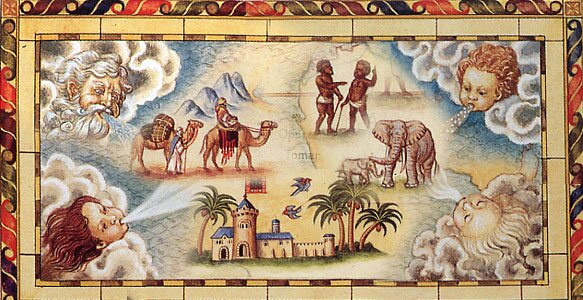|
Sometimes the tribe was nomadic and traveled with their animals to the best places to graze and drink. Other tribes settled villages, towns and sometimes cities. Between these towns, trade routes developed. Some routes were over land; others were traveled by river or sea.
People traveled on routes across North Africa when the great Sahara desert was still a wet region. When the land dried and no longer produced crops, overland trading became very difficult. Although people had pack animals, such as cattle horse, and oxen, travel was not easy. These animals could not journey the great distance between each oasis.
In about 300 AD, the Arabian camel was brought to Africa and became the ship of the desert. The camel stores fat in its hump and water in its stomach, which allows it to travel up to ten days without fresh watertwice the distance of an ox or a horse. All of a sudden trade was much more dependable.
They traded crops, such as salt, spices, rice, wheat, barley, millet, olives, yams, and sorghum. Goats, fish, cattle, and fowl were some of the livestock bought and sold. People also traded copper, bronze, iron and gold. The metals were useful for making tools, coins, decorations, and weapons.
Each tribe had its wise elders and priests. Many were women but most were men. They would lead the tribe, and if they grew very powerful they were considered kings or queens. People considered them related to the gods. They often organized the building of religious temples and dams and assembled armies to defend their families. Their subjects often paid taxes to pay for these things.
Although some of these kingdoms did not last long and were replaced by others, a few lasted thousands of years. The rule of one kings family for several generations is called a dynasty. There have been a few African kingdoms that have extended for several dynasties. As other cultures began to grow strong all over the Mediterranean other kingdoms began to push their way into Africa. Small tribes grouped together to fight off the invaders, such as the Greeks, Phoenicians, and Romans.
Major African Kingdoms:
West: Ghana, Benin, Bornu, Songhay and Takrur (clickable feature)
North: Mauritania, Tripolitania, Cyrenaica, Egypt, and Cush
East: Ethiopia, Bunyoro, Aksum, Buganda, Rwanda, Bemba and Loba
South: Lesotho, Zulu; Tswana, Swazi, Shona and Mbundu
African peoples could be as different from each other as they were to people far away in Greece, India, or Arabic countries in Asia, just across the Red Sea. Their religious gods, temples, beliefs and cultures were unique. Sometimes they traded peacefully. Other times they fought for territory in wars.
|
